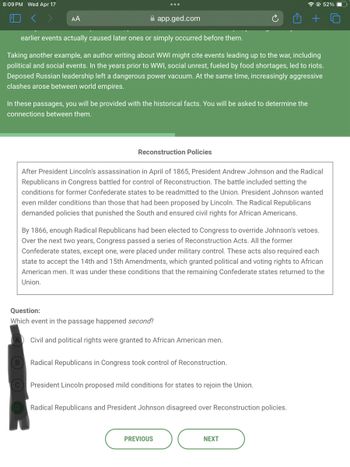Question

Transcribed Image Text:8:09 PM Wed Apr 17
AA
app.ged.com
+
52%
earlier events actually caused later ones or simply occurred before them.
Taking another example, an author writing about WWI might cite events leading up to the war, including
political and social events. In the years prior to WWI, social unrest, fueled by food shortages, led to riots.
Deposed Russian leadership left a dangerous power vacuum. At the same time, increasingly aggressive
clashes arose between world empires.
In these passages, you will be provided with the historical facts. You will be asked to determine the
connections between them.
Reconstruction Policies
After President Lincoln's assassination in April of 1865, President Andrew Johnson and the Radical
Republicans in Congress battled for control of Reconstruction. The battle included setting the
conditions for former Confederate states to be readmitted to the Union. President Johnson wanted
even milder conditions than those that had been proposed by Lincoln. The Radical Republicans
demanded policies that punished the South and ensured civil rights for African Americans.
By 1866, enough Radical Republicans had been elected to Congress to override Johnson's vetoes.
Over the next two years, Congress passed a series of Reconstruction Acts. All the former
Confederate states, except one, were placed under military control. These acts also required each
state to accept the 14th and 15th Amendments, which granted political and voting rights to African
American men. It was under these conditions that the remaining Confederate states returned to the
Union.
Question:
Which event in the passage happened second?
A Civil and political rights were granted to African American men.
B
Radical Republicans in Congress took control of Reconstruction.
C
President Lincoln proposed mild conditions for states to rejoin the Union.
D
Radical Republicans and President Johnson disagreed over Reconstruction policies.
PREVIOUS
NEXT
Expert Solution
This question has been solved!
Explore an expertly crafted, step-by-step solution for a thorough understanding of key concepts.
Step by stepSolved in 2 steps
